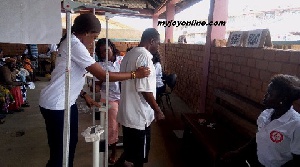 Stroke is the fourth leading in-patient cause of death - Study
Stroke is the fourth leading in-patient cause of death - Study
Stroke is a medical and psychological burden that most Ghanaian families can relate to. It is a life-threatening disease that occurs when the blood supply to the brain is cut off.
Globally it is the second leading cause of death in an adult population and the leading cause of death in middle and low-income countries. Hypertension is the main risk factor for stroke, other risks include diabetes mellitus, smoking, obesity, and increasing age just to mention a few.
Over the years there has been an epidemiological transition from communicable diseases to non-communicable diseases. A research study conducted in the ten regions of Ghana in 2003 in 32 sentinel hospitals revealed stroke as the fourth leading in-patient cause of death.
Uncontrolled blood pressure is the most consistent cause of stroke in Ghana. It contributes about 70% of all cases. About 40% of stroke patients who come to Komfo Anokye Teaching Hospital (KATH) to seek treatment do not survive.
With the increasing incidence of uncontrolled hypertension in Ghana, there has been a sharp rise in the number of stroke patients. There has been nearly a 300% increase in the burden of stroke over the past 30 years at KATH.
The poor management of stroke patients in Ghana is a major contributor to the increased mortality rate. The Hospital introduced a stroke unit in 2012 dedicated solely to the care of acute stroke patients and also serves as a training centre for healthcare personnel on the management of stroke patients.
There is evidence to support the assertion that mortality from stroke has reduced since the introduction of the unit. As a result of this achievement, there has been a call for the setting up of stroke units and rehabilitation centres across the nation.
There has also been the need also to expand and renovate the current stroke unit in KATH since currently there are only six beds at the stroke unit. There are also limited cardiac monitors (just one available), infusion pumps etcetera needed to properly manage stroke patients.
With the increasing number of patients, these resources are woefully inadequate to provide the best of care especially in the largest teaching hospital in Northern Ghana.
For months now, the medical students of School of Medical Sciences-KNUST have sort to support the stroke unit with some needed equipment and have been raising awareness and funds for the said cause.
The project has been dubbed the “lifesaver’s kit” and we have so far received massive support from individuals and corporate organizations.
In the bid to raise more funds for the project a concert dubbed Judah Praise will be organised at the Great Hall of KNUST on 27th January 2018.
The simplest acts of kindness are by far more powerful than thousand heads bowing in prayer as we strive to strike out stroke.
Kindly Donate via our GOFUNDME account- http://gofundme.com/juadah-praise-18-lifesavers-kit
REFERENCE?
1. Agyemang, C. Sanuade, O. Stroke Burden in Ghana: A Review of Research. http://ugspace.ug.edu.gh/handle/123456789/4577,accessed: 2018-01-14 16:21:11
2. Agyemang, C. Attah-Adjepong, G. Owusu-Dabo, E. De-Graft Aikins, A. Addo J, Edusei A K, Nkum B C. Ogedegbe G Stroke in Ashanti Region of Ghana https://www.ncbi.nlm.nih.gov/pmc/articles/PMC3645146/,accessed: 2018-01-14 16:19:43
3. Awuku Malik, Stroke is killing more people than malaria. https://www.myjoyonline.com/lifestyle/2017/October-31st/stroke-is-killing-more-people-than-malaria.php,accessed: 2018-01-14 16:45:45